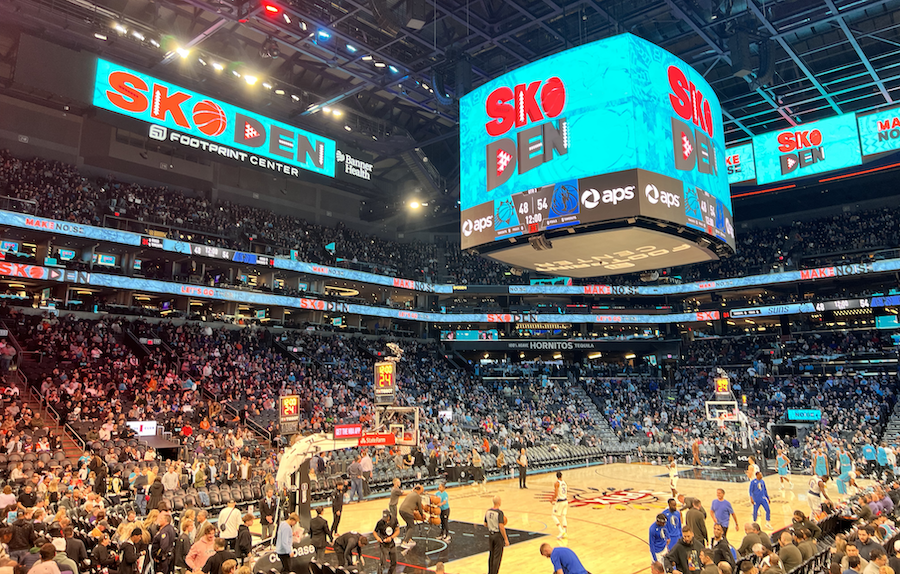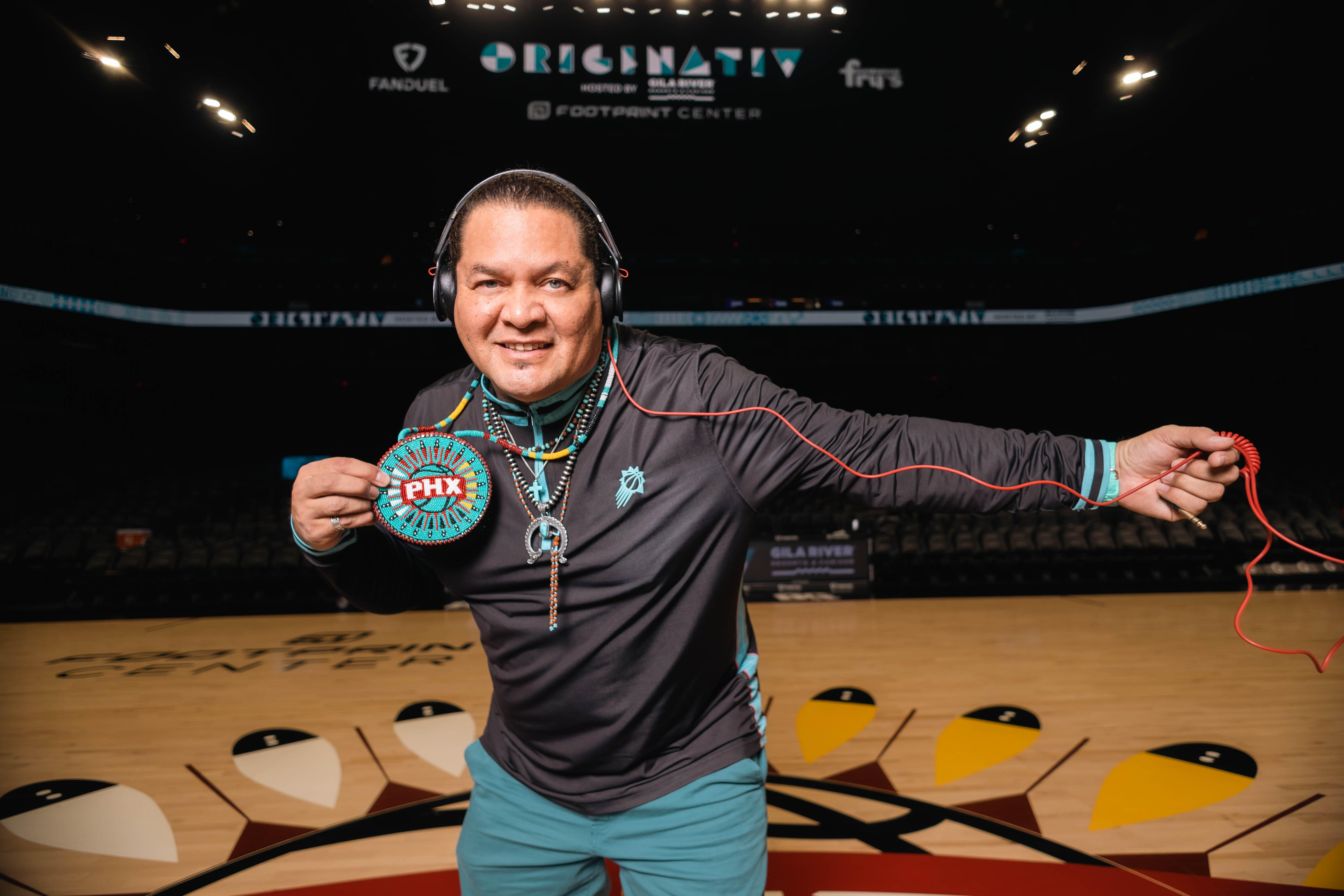
- Details
- By Darren Thompson
PHOENIX - High above the court at the Footprint Center, the scoreboard flashed some uniquely Native encouragement to the hometown Phoenix Suns basketball team: SKODEN.
The scoreboard shout out — a bit of popular Native slang for "Let's Go Then" — was one of the many Indigenous touches on display on Thursday as the Suns paid recognition to Arizona’s 22 Tribal communities in a game against the Dallas Mavericks. It wasn’t the first time this season the organization showcased Arizona’s Indigenous heritage, though, and it won’t be the last, according to the team.
Thursday’s game was the sixth event this season at the Footprint Center, located in downtown Phoenix. Organizers curated an evening to feature Indigenous culture, music, food, dance and leaders in the community throughout the entirety of the game. Attendees of Thursday’s game were welcomed at the main entrance of the arena by the music of Navajo deejay Mike Sixkiller and a display of all the flags of all 22 tribal nations in Arizona.
“We want Native people to be comfortable in this space,” Phoenix Suns (NBA) and Phoenix Mercury (WNBA) Senior Director of Live Presentation Shawn Martinez told Native News Online. “Nobody in live entertainment is celebrating Native culture like we’re doing here in Phoenix.”
That commitment to celebrating Native culture is happening, at least in part, because of Martinez, a Navajo Nation citizen raised in Window Rock, Arizona. He’s been working in professional sports for more than 20 years, including 12 years with the Denver Nuggets and six years with the Detroit Pistons. Martinez was hired by the Suns in 2020, during the middle of the COVID-19 pandemic, and this is his third season. He very well may be the only enrolled Tribal citizen that is the director of entertainment for a professional sports organization, too.
And it shows.
From banners touting "Skoden" and "Stoodis" to the National Anthem sung by Haliwa-Saponi Tribal Citizen Brooke Simpson, and an intertribal song sung by the Wild Medicine Drum Group to the Gila River Basket Dancers performing on the court, the organization rolled out the red carpet for attendees to learn about the local Indigenous communities and cultures.
“It’s because I’m from the Rez,” said Martinez, who was also instrumental in collaborating the Suns’ Nike City Edition Uniforms with Suns Sr. Director of Marketing Graham Wincott, Suns Creative Director Chris Grasha, tribal leaders from the Inter Tribal Council of Arizona, former Navajo Nation President Jonathan Nez, NABI, Nike N7, Phoenix Indian Center, Heard Museum, and Cahokia SocialTech + ArtSpace.
The uniforms were years in the making and feature turquoise as the base color, the names of each Tribal Nation in Arizona, colors of the medicine wheel (white, black, yellow and red), and much more.
 “We want Native people to be comfortable in this space,” says Phoenix Suns’ Senior Director of Live Entertainment Shawn Martinez, a Navajo Nation citizen. Photo by Roshan, a Navajo Nation photographer based in Phoenix, Arizona.
“We want Native people to be comfortable in this space,” says Phoenix Suns’ Senior Director of Live Entertainment Shawn Martinez, a Navajo Nation citizen. Photo by Roshan, a Navajo Nation photographer based in Phoenix, Arizona.
In addition to the many collaborations Martinez has been able to facilitate, he’s also in charge of live entertainment during the game. Thursday’s game featured music from the world champion drum group Northern Cree, Crow music sensation Christian “Supaman” Parrish Takes the Gun, Halluci-Nation (widely known as a “Tribe Called Red”), and many others.
“For an evening, attendees of the games are introduced to the amazing talents our people have,” said Martinez of his music selection. He’s also a DJ, known for 25 years as DJ Tribal Touch, where he recently performed at the grand opening of the Smithsonian’s National Native American Veterans Memorial in Washington, D.C. last November.
There are 10 total ORIGINATIV events — the word the Suns are using to describe their Native-themed entertainment — during the 2022-2023 season. The remaining events are scheduled for February 24 (vs. Oklahoma City Thunder), March 14 (vs. Milwaukee Bucks), March 16 (vs. Orlando Magic, and April 4 (vs. San Antonio Spurs).
Each night has different Indigenous performers from Tribes that are Arizona based, and they will also include food vendors (outside the stadium), music, dance, and other recognitions for leaders in the Arizona Native community.
More Stories Like This
Two Indigenous Group Exhibits Opening January 9, 2026 at WatermarkWatermark Art Center to Host “Minwaajimowinan — Good Stories” Exhibition
Museums Alaska Awards More Than $200,000 to 12 Cultural Organizations Statewide
Zuni Youth Enrichment Project Takes Top Emerging Artist Apprentices to Phoenix for Artistic Exploration and Cultural Immersion
From Dishwasher to Award-Winning Chef: Laguna Pueblo's Josh Aragon Serves Up Albuquerque's Best Green Chile Stew
Help us defend tribal sovereignty.
At Native News Online, our mission is rooted in telling the stories that strengthen sovereignty and uplift Indigenous voices — not just at year’s end, but every single day.
Because of your generosity last year, we were able to keep our reporters on the ground in tribal communities, at national gatherings and in the halls of Congress — covering the issues that matter most to Indian Country: sovereignty, culture, education, health and economic opportunity.
That support sustained us through a tough year in 2025. Now, as we look to the year ahead, we need your help right now to ensure warrior journalism remains strong — reporting that defends tribal sovereignty, amplifies Native truth, and holds power accountable.
 The stakes couldn't be higher. Your support keeps Native voices heard, Native stories told and Native sovereignty defended.
The stakes couldn't be higher. Your support keeps Native voices heard, Native stories told and Native sovereignty defended.
Stand with Warrior Journalism today.
Levi Rickert (Potawatomi), Editor & Publisher

